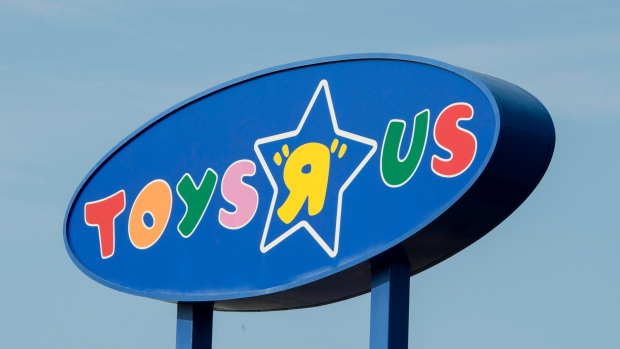Mar 15, 2018
Toys 'R' US in talks to sell Canadian business as it shutters U.S. stores
The Canadian Press

Toys "R" Us is in talks to sell its entire Canadian business as it works to shutter its 70-year-old U.S. operations, but analysts are skeptical about the future of the brick-and-mortar toy retailer's existing business model.
The company confirmed Thursday it is in "active discussions regarding a transaction that would result in an acquisition of the entire Canadian business," as the U.S. company seeks approval in its bankruptcy proceedings for the sale of its equity interest in the Canadian business.
The statement came a day after California-based toy company MGA Entertainment confirmed its CEO Isaac Larian and affiliated investors have made a bid for the Toys "R" Us Canada operations.
"Toys "R" Us Canada is a good business," Larian said in a statement. "They run it efficiently, and have good leadership. At the right price, it makes economical sense."
Toys "R" Us CEO David Brandon has said the company will try to bundle its Canadian business with about 200 U.S. stores as it looks to find a buyer, but the MGA spokesperson declined to provide details on how much of the business Larian has made a bid for.
The president of the company's Canadian branch released a statement late Thursday saying things will be 'business as usual' in the country's 82 stores.
"In Canada, all 82 stores remain open for business to serve you, our customers, honouring all our policies, warranties, Baby Registry, Gift Cards and RClub loyalty programs without change. We are taking the necessary steps to ensure the iconic Toys“R”Us and Babies“R”Us brands live on for many generations to come in Canada," Toys "R" Us Canada President Melanie Teed-Murch said in a statement.
"Our Canadian operations are continuing in the normal course and we continue to partner with the trend products you want from the brands that you trust."
The U.S. company has moved to close or sell all its 740 stores in the United States, finalizing the downfall of the chain that succumbed to heavy debt and relentless trends that undercut its business, from online shopping to mobile games.
It's already shuttering its business in the United Kingdom and is reportedly likely to liquidate its businesses in Australia, France, Poland, Portugal and Spain.
That would leave its Canadian stores among the few left standing.
The Canadian Toys "R" Us business has said it remains committed to serving its customers at its 82 stores across Canada and e-commerce site, which remain open for business.
The Canadian division filed for creditor protection in September but said it had financing commitments to ensure normal operations throughout the proceedings and now plans to forge ahead under a new owner.
But industry analysts aren't convinced the Canadian stores will be able to go it alone.
The company is too generalized and spread out to compete against the increasing online and discount retailer competition, said Mark Satov, founder of Satov Consultants Inc.
"They need to be some combination of fewer stores and smaller footprint. There's not room for that much square footage in Canada for a specialty toy retailer," he said.
"They either need to be a super high-end experience that's boutique and niche...or they actually have to be for sure the cheapest, have a great online and offline experience, and actually get the manufacturers to give them lots of skews that no one else can get."
The Canadian operations of Toys "R" Us are managed in Canada and operate autonomously from the U.S. operations, giving them a separate and healthy balance sheet, said Satov, but any buyer would still need to push for a discount.
"If I were to buy the Toys "R" Us business in Canada, I would be buying it at a discount, I'd be buying the leases at a discount, and I'd be buying the inventory at a discount, because I think there's a lot of risk to the business in the long term, even if it's doing OK today."
Any business trying to go ahead alone with only a smaller Canadian footprint would be disadvantaged, said Ernst & Young retail analyst Daniel Baer.
"You need scale and you need to build a brand, and to be orphaned in Canada alone would be difficult. I won't say it's impossible, but it's quite difficult, because you're going to lose a lot of scale if you keep operations in one country and you close them in a far bigger market," he said.
"I think if you're having trouble competing already, you're going to have even more trouble once you're a smaller operation."
- with files from BNN.ca




